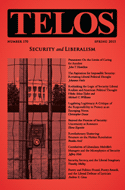 When Edward Snowden, on June 9, 2013, revealed his identity in a video interview posted on the website of the Guardian, he invoked the intellectual framework of liberalism in order to explain why he had leaked a massive trove of secret documents about the spying and data collection practices of the National Security Administration (NSA) and its partner agencies. Having regularly witnessed the legal abuses of the NSA as a technical assistant for the CIA and, subsequently, as an employee of the defense contractor Booz Allen Hamilton, Snowden explained that “over time [the] awareness of wrongdoing builds up and you feel compelled to talk about it . . . until eventually you realize that these things need to be determined by the public, not by somebody who’s simply hired by the government.” When Edward Snowden, on June 9, 2013, revealed his identity in a video interview posted on the website of the Guardian, he invoked the intellectual framework of liberalism in order to explain why he had leaked a massive trove of secret documents about the spying and data collection practices of the National Security Administration (NSA) and its partner agencies. Having regularly witnessed the legal abuses of the NSA as a technical assistant for the CIA and, subsequently, as an employee of the defense contractor Booz Allen Hamilton, Snowden explained that “over time [the] awareness of wrongdoing builds up and you feel compelled to talk about it . . . until eventually you realize that these things need to be determined by the public, not by somebody who’s simply hired by the government.”
Continue reading →
By Telos Press · Sunday, December 7, 2014 Writing in the Washington Post, George Will discusses Joel Kotkin’s The New Class Conflict (recently published by Telos Press) and the reasons why today’s government serves the wealthy and powerful.
Continue reading →
By Michael Millerman · Tuesday, August 12, 2014 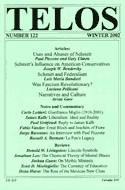 Like Spinoza, many liberal thinkers have defined the liberty they promote in terms of the necessity of submitting to the law that guarantees it. This is a unique kind of rule of law, a rule of the “‘politically correct,’ universalist, managerial-liberal” (9) law of contemporary liberals. Both internationally and domestically, this law requires the muscular imposition of questionable political, moral, and economic principles, by means of an insidious and often nauseating bureaucratic, technocratic, mediacratic apparatus, onto largely unwilling publics. Crucially, the freedom championed by such liberals and allegedly secured by their law does not include the freedom to refuse their domination root and branch. Like Spinoza, many liberal thinkers have defined the liberty they promote in terms of the necessity of submitting to the law that guarantees it. This is a unique kind of rule of law, a rule of the “‘politically correct,’ universalist, managerial-liberal” (9) law of contemporary liberals. Both internationally and domestically, this law requires the muscular imposition of questionable political, moral, and economic principles, by means of an insidious and often nauseating bureaucratic, technocratic, mediacratic apparatus, onto largely unwilling publics. Crucially, the freedom championed by such liberals and allegedly secured by their law does not include the freedom to refuse their domination root and branch.
Continue reading →
By Russell A. Berman · Monday, June 16, 2014 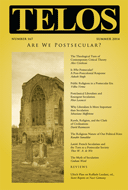 Critical theory inherited classical accounts of social change that linked modernization processes to secularization: in order for societies to overcome traditionalist structures and pursue the accelerated development of modernity, they would have to escape the grip of religion. This is perhaps most famously the case for Marx, who, in the introduction to his Critique of Hegel’s Philosophy of Right, declared religion “the opium of the people,” blocking the way of progress: “The abolition of religion as the illusory happiness of the people is the demand for their real happiness. To call on them to give up their illusions about their condition is to call on them to give up a condition that requires illusions. The criticism of religion is, therefore, in embryo, the criticism of that vale of tears of which religion is the halo.” To surmount a social condition that produces unhappiness requires renouncing the systematic concealing of that condition which is, so Marx, the genuine function of religion, the ultimate paradigm of ideology as false consciousness. Critical theory inherited classical accounts of social change that linked modernization processes to secularization: in order for societies to overcome traditionalist structures and pursue the accelerated development of modernity, they would have to escape the grip of religion. This is perhaps most famously the case for Marx, who, in the introduction to his Critique of Hegel’s Philosophy of Right, declared religion “the opium of the people,” blocking the way of progress: “The abolition of religion as the illusory happiness of the people is the demand for their real happiness. To call on them to give up their illusions about their condition is to call on them to give up a condition that requires illusions. The criticism of religion is, therefore, in embryo, the criticism of that vale of tears of which religion is the halo.” To surmount a social condition that produces unhappiness requires renouncing the systematic concealing of that condition which is, so Marx, the genuine function of religion, the ultimate paradigm of ideology as false consciousness.
Continue reading →
By James King · Friday, April 18, 2014 The following paper was presented at the Eighth Annual Telos Conference, held on February 15–16, 2014, in New York City.
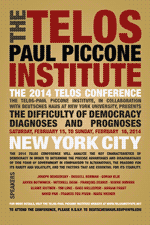 In the perspective of many, the prime criticism of liberal theories of democratic politics is that such theories proceed with a certain false and idealized individual in mind—these are great theories, elegant or hubristic, but at bottom, theories and not “real politics.” Political liberalism wrongly imagines the citizen to be a rational individual, sure of his will and life plans—or is this imagining wrong? The deeper critique holds that liberalism describes a peculiar individual, and that this individual really exists, but looks strangely like the liberal theorist and his class. Thus, for example, John Rawls’s theory of justice is suggested to fail women and the profoundly disabled. My critique today follows in this vein; I wish to add to this characterization of liberalism’s presumed political actor by showing him to be antiheroic. In the perspective of many, the prime criticism of liberal theories of democratic politics is that such theories proceed with a certain false and idealized individual in mind—these are great theories, elegant or hubristic, but at bottom, theories and not “real politics.” Political liberalism wrongly imagines the citizen to be a rational individual, sure of his will and life plans—or is this imagining wrong? The deeper critique holds that liberalism describes a peculiar individual, and that this individual really exists, but looks strangely like the liberal theorist and his class. Thus, for example, John Rawls’s theory of justice is suggested to fail women and the profoundly disabled. My critique today follows in this vein; I wish to add to this characterization of liberalism’s presumed political actor by showing him to be antiheroic.
Continue reading →
By Beau Mullen · Friday, March 7, 2014 As an occasional feature on TELOSscope, we highlight a past Telos article whose critical insights continue to illuminate our thinking and challenge our assumptions. Today, Beau Mullen looks at Gabriella Slomp’s “Thomas Hobbes, Carl Schmitt, and the Event of Conscription” from Telos 147 (Summer 2009).
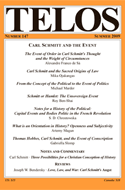 As Gabriella Slomp points out in the opening of her article “Thomas Hobbes, Carl Schmitt, and the Event of Conscription,” scholars are split on how to view the relationship between Hobbes and Schmitt. Some see Schmitt as Hobbes’s heir apparent, while others think that Schmitt’s thinking is in fact a rejection of much of Hobbes’s work. Both thinkers emphasize man’s warlike nature, they hold that the state exists to protect men from violent death at the hands of other men, and they maintain that a strong state with unlimited power is best suited to this aim. Both agree that man has an obligation to the state that is reciprocal to the duty of the state to provide security. In this piece, Slomp examines both Schmitt’s and Hobbes’s views of the extent of this obligation and comes to the conclusion that the two are in fact in disagreement. Using their writings on conscription, Slomp reveals that Hobbes has much more concern for the sovereignty of the individual whereas Schmitt never wavers in his affording primacy to the group or state. As Gabriella Slomp points out in the opening of her article “Thomas Hobbes, Carl Schmitt, and the Event of Conscription,” scholars are split on how to view the relationship between Hobbes and Schmitt. Some see Schmitt as Hobbes’s heir apparent, while others think that Schmitt’s thinking is in fact a rejection of much of Hobbes’s work. Both thinkers emphasize man’s warlike nature, they hold that the state exists to protect men from violent death at the hands of other men, and they maintain that a strong state with unlimited power is best suited to this aim. Both agree that man has an obligation to the state that is reciprocal to the duty of the state to provide security. In this piece, Slomp examines both Schmitt’s and Hobbes’s views of the extent of this obligation and comes to the conclusion that the two are in fact in disagreement. Using their writings on conscription, Slomp reveals that Hobbes has much more concern for the sovereignty of the individual whereas Schmitt never wavers in his affording primacy to the group or state.
Continue reading →
|
|
 When Edward Snowden, on June 9, 2013, revealed his identity in a video interview posted on the website of the Guardian, he invoked the intellectual framework of liberalism in order to explain why he had leaked a massive trove of secret documents about the spying and data collection practices of the National Security Administration (NSA) and its partner agencies. Having regularly witnessed the legal abuses of the NSA as a technical assistant for the CIA and, subsequently, as an employee of the defense contractor Booz Allen Hamilton, Snowden explained that “over time [the] awareness of wrongdoing builds up and you feel compelled to talk about it . . . until eventually you realize that these things need to be determined by the public, not by somebody who’s simply hired by the government.”
When Edward Snowden, on June 9, 2013, revealed his identity in a video interview posted on the website of the Guardian, he invoked the intellectual framework of liberalism in order to explain why he had leaked a massive trove of secret documents about the spying and data collection practices of the National Security Administration (NSA) and its partner agencies. Having regularly witnessed the legal abuses of the NSA as a technical assistant for the CIA and, subsequently, as an employee of the defense contractor Booz Allen Hamilton, Snowden explained that “over time [the] awareness of wrongdoing builds up and you feel compelled to talk about it . . . until eventually you realize that these things need to be determined by the public, not by somebody who’s simply hired by the government.”  Like Spinoza, many liberal thinkers have defined the liberty they promote in terms of the necessity of submitting to the law that guarantees it. This is a unique kind of rule of law, a rule of the “‘politically correct,’ universalist, managerial-liberal” (9) law of contemporary liberals. Both internationally and domestically, this law requires the muscular imposition of questionable political, moral, and economic principles, by means of an insidious and often nauseating bureaucratic, technocratic, mediacratic apparatus, onto largely unwilling publics. Crucially, the freedom championed by such liberals and allegedly secured by their law does not include the freedom to refuse their domination root and branch.
Like Spinoza, many liberal thinkers have defined the liberty they promote in terms of the necessity of submitting to the law that guarantees it. This is a unique kind of rule of law, a rule of the “‘politically correct,’ universalist, managerial-liberal” (9) law of contemporary liberals. Both internationally and domestically, this law requires the muscular imposition of questionable political, moral, and economic principles, by means of an insidious and often nauseating bureaucratic, technocratic, mediacratic apparatus, onto largely unwilling publics. Crucially, the freedom championed by such liberals and allegedly secured by their law does not include the freedom to refuse their domination root and branch.  Critical theory inherited classical accounts of social change that linked modernization processes to secularization: in order for societies to overcome traditionalist structures and pursue the accelerated development of modernity, they would have to escape the grip of religion. This is perhaps most famously the case for Marx, who, in the introduction to his Critique of Hegel’s Philosophy of Right, declared religion “the opium of the people,” blocking the way of progress: “The abolition of religion as the illusory happiness of the people is the demand for their real happiness. To call on them to give up their illusions about their condition is to call on them to give up a condition that requires illusions. The criticism of religion is, therefore, in embryo, the criticism of that vale of tears of which religion is the halo.” To surmount a social condition that produces unhappiness requires renouncing the systematic concealing of that condition which is, so Marx, the genuine function of religion, the ultimate paradigm of ideology as false consciousness.
Critical theory inherited classical accounts of social change that linked modernization processes to secularization: in order for societies to overcome traditionalist structures and pursue the accelerated development of modernity, they would have to escape the grip of religion. This is perhaps most famously the case for Marx, who, in the introduction to his Critique of Hegel’s Philosophy of Right, declared religion “the opium of the people,” blocking the way of progress: “The abolition of religion as the illusory happiness of the people is the demand for their real happiness. To call on them to give up their illusions about their condition is to call on them to give up a condition that requires illusions. The criticism of religion is, therefore, in embryo, the criticism of that vale of tears of which religion is the halo.” To surmount a social condition that produces unhappiness requires renouncing the systematic concealing of that condition which is, so Marx, the genuine function of religion, the ultimate paradigm of ideology as false consciousness.  In the perspective of many, the prime criticism of liberal theories of democratic politics is that such theories proceed with a certain false and idealized individual in mind—these are great theories, elegant or hubristic, but at bottom, theories and not “real politics.” Political liberalism wrongly imagines the citizen to be a rational individual, sure of his will and life plans—or is this imagining wrong? The deeper critique holds that liberalism describes a peculiar individual, and that this individual really exists, but looks strangely like the liberal theorist and his class. Thus, for example, John Rawls’s theory of justice is suggested to fail women and the profoundly disabled. My critique today follows in this vein; I wish to add to this characterization of liberalism’s presumed political actor by showing him to be antiheroic.
In the perspective of many, the prime criticism of liberal theories of democratic politics is that such theories proceed with a certain false and idealized individual in mind—these are great theories, elegant or hubristic, but at bottom, theories and not “real politics.” Political liberalism wrongly imagines the citizen to be a rational individual, sure of his will and life plans—or is this imagining wrong? The deeper critique holds that liberalism describes a peculiar individual, and that this individual really exists, but looks strangely like the liberal theorist and his class. Thus, for example, John Rawls’s theory of justice is suggested to fail women and the profoundly disabled. My critique today follows in this vein; I wish to add to this characterization of liberalism’s presumed political actor by showing him to be antiheroic.  As Gabriella Slomp points out in the opening of her article “Thomas Hobbes, Carl Schmitt, and the Event of Conscription,” scholars are split on how to view the relationship between Hobbes and Schmitt. Some see Schmitt as Hobbes’s heir apparent, while others think that Schmitt’s thinking is in fact a rejection of much of Hobbes’s work. Both thinkers emphasize man’s warlike nature, they hold that the state exists to protect men from violent death at the hands of other men, and they maintain that a strong state with unlimited power is best suited to this aim. Both agree that man has an obligation to the state that is reciprocal to the duty of the state to provide security. In this piece, Slomp examines both Schmitt’s and Hobbes’s views of the extent of this obligation and comes to the conclusion that the two are in fact in disagreement. Using their writings on conscription, Slomp reveals that Hobbes has much more concern for the sovereignty of the individual whereas Schmitt never wavers in his affording primacy to the group or state.
As Gabriella Slomp points out in the opening of her article “Thomas Hobbes, Carl Schmitt, and the Event of Conscription,” scholars are split on how to view the relationship between Hobbes and Schmitt. Some see Schmitt as Hobbes’s heir apparent, while others think that Schmitt’s thinking is in fact a rejection of much of Hobbes’s work. Both thinkers emphasize man’s warlike nature, they hold that the state exists to protect men from violent death at the hands of other men, and they maintain that a strong state with unlimited power is best suited to this aim. Both agree that man has an obligation to the state that is reciprocal to the duty of the state to provide security. In this piece, Slomp examines both Schmitt’s and Hobbes’s views of the extent of this obligation and comes to the conclusion that the two are in fact in disagreement. Using their writings on conscription, Slomp reveals that Hobbes has much more concern for the sovereignty of the individual whereas Schmitt never wavers in his affording primacy to the group or state. 

